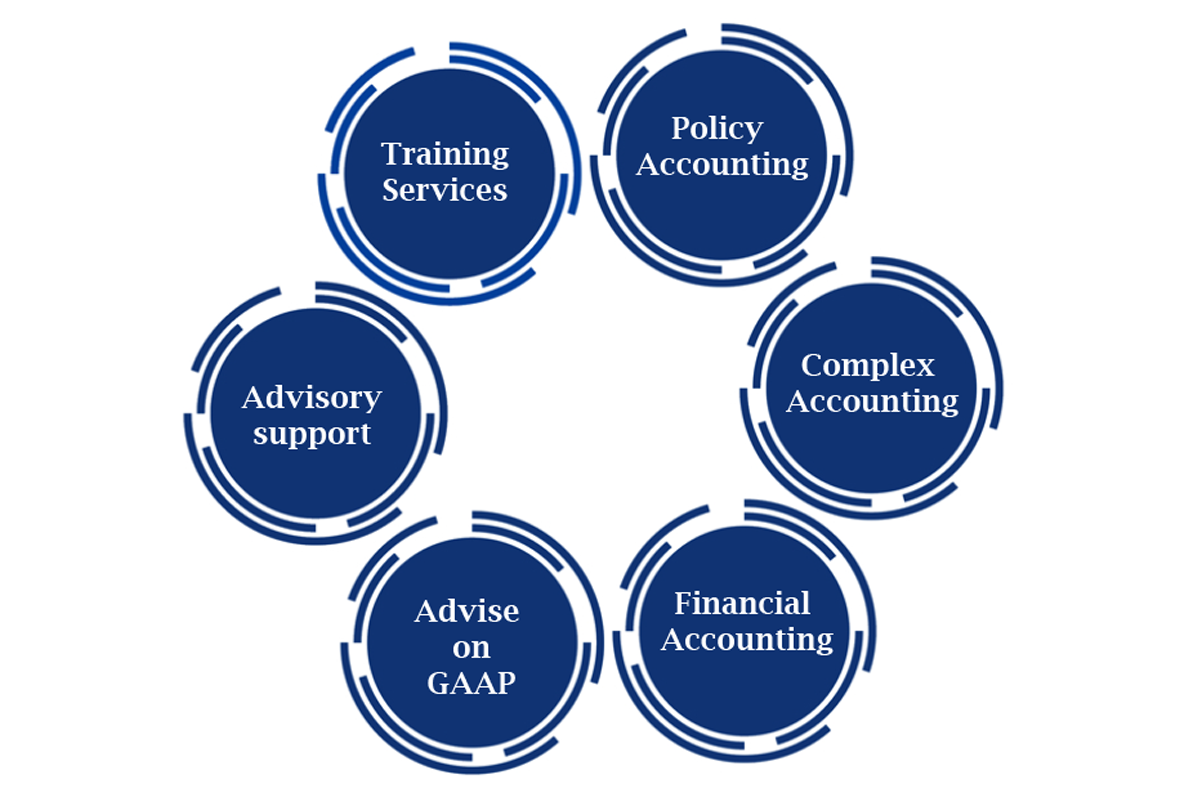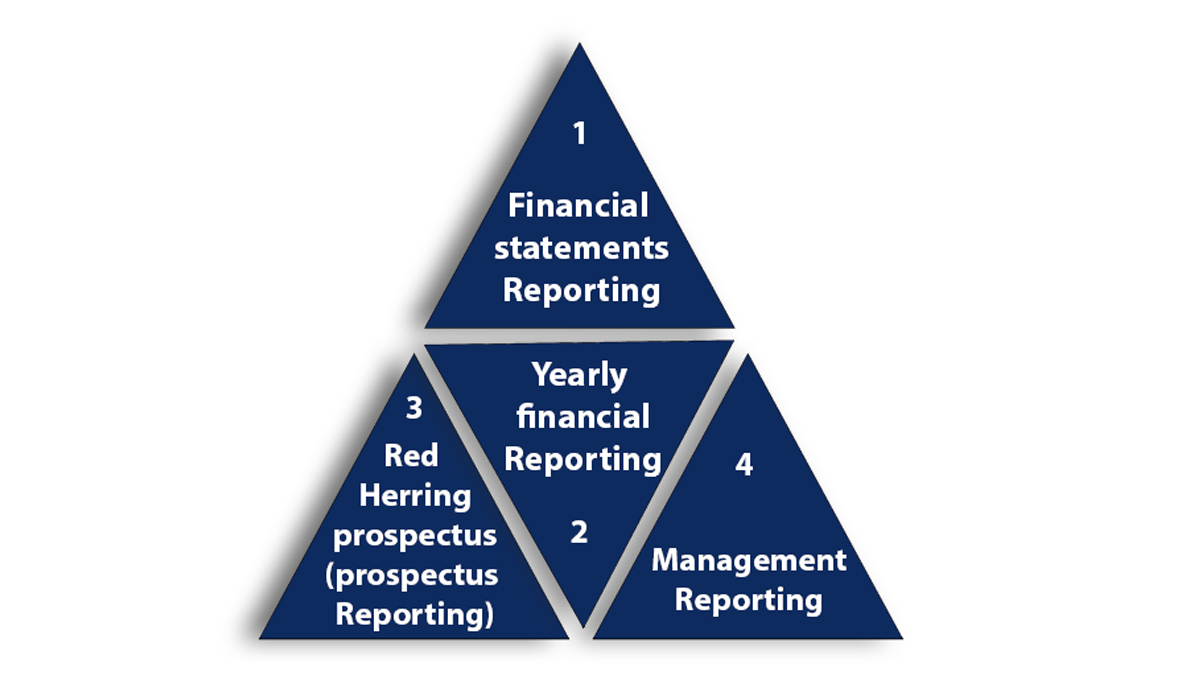Accounting Advisory and Financial Reporting
Accounting Advisory is the advice provided by a third-party consultant to an organization on the standards required to be followed for accounting practices. This also includes providing compliance and monitoring the account and audit functions of an organization. In India, the Institute of Chartered Accountants of India (ICAI) provides specific standards for carrying out advisory and financial reporting services. An increased amount of international compliance in reporting standards and accounting have brought the requirement of accounting from an expert.
Financial reporting is also required as per the ICAI, Indian Accounting Standards, International Accounting Standards, and the GAAP. Due to this, organizations require a well-versed expert to remove the challenges in accounting and reporting.
What are the Different forms of Account Advisory Services?

Policy Accounting
Policy accounting is a systematic way of preparing strategies to make better financial reports. These strategies can be documented and used for future financial accounting. Documentation is imperative in today's accounting, as this will reduce the issues in standards of accounting.
An organization using this system of policy accounting will utilize the above methods to reduce the complexities in accounting. Through policy accounting, an organization can improve its performance. Complex accounting information can be converted into simple forms, thus reducing the burden of an organization. Policy accounting comprises of the following:
- Prepared Management Criteria.
- Documented Strategies of Accounting Practices.
- Converting Complex Financial Information into Simple Form.
Complex Accounting
Complex Accounting involves understanding the different standards of implementing Indian AS, International Accounting Standards, and the procedures followed by GAAP. For a seamless integration of accounting standards, documentation is required to be prepared by the company. Reports on the procedures followed must be adhered to. These effective accounting practices can be followed by the organization, which falls in line with the standards of Indian AS, International Accounting Standards, and GAAP.
Financial Accounting
Financial Accounting is understood as preparing accounts for an organization to meet the standards of the ICAI. Proper accounts must be prepared for all organizations. Practicing Chartered accountants are required to prepare accounts as per the requirements of the Companies Act 2013 and the ICAI. When an organization has a subsidiary or a group of subsidiaries, it is mandatory to prepare consolidated accounts for that subsidiary. Financial accounting involves the following:
- Providing information on the account and finances of the group of companies.
- Following and implementing accounting procedures that can be followed by organizations.
- Preparing consolidated financial statements for a group of companies.
- Combined financial statements and reporting.
- Selecting the proper accounting policy for the company. This will also include selecting international accounting standards for your organization.
- Preparing financial statements such as profits and loss account, balance sheets showing the assets and liabilities and opening balance statements.
Advice on GAAP
Generally Accepted Accounting Principles (GAAP) is the international accounting standards and rules that have to be complied with worldwide. Sector-specific rules have to be followed if a company if using the principles of GAAP. Every country can follow its accounting standard. However, there has to be no clash in the use of accounting principles. Hence accounting principles adopted by a particular country must not clash with the standards under GAAP. In India, the accounting standards followed are the Ind AS. These standards have to comply with the rules of GAAP. Under Accounting Advisory and Financial Reporting, advice on GAAP is also provided. Advice on GAAP includes the following:
- Advice on GAAP Conversion Techniques.
- Assistance with adopting GAAP, Ind AS, and other accounting standards.
- Finance reporting compliance under different standards.
Advisory Support
Accounting Advisory is not just limited to advice on accounts but also covers M and A advisory, listing advisory, and other services. Advisory support services cover listing agreements when companies want to list their securities in stock exchanges. The following are the types of advisory services that come under Accounting Advisory:
- Advice on listing (IPO).
- Listing of Securities.
- Criteria for pricing securities.
- Corporate structure advisory and taxation services.
- Compliance under respective Corporate Governance principles of accounting.
Training Services
Third-party organizations must equip themselves with relevant standards related to accounting advisory practices. Hence, frequent training must be provided to third-party consultants to provide expert advice to organizations willing to use accounting advisory and financial reporting services.
Types of Financial Reporting

-
Financial Statements reporting
This form of reporting includes the general types of reporting carried out by a company, including the profit and loss statement and the balance sheet of the company.
-
Yearly Financial Reporting
As per the Indian Calendar, auditing has to be carried out in the relevant financial year, i.e., April 1 to March 31. During this fiscal period, organizations are required to submit yearly financial reporting as per the relevant law.
When companies go for an initial public offer (IPO), they must prepare a prospectus to offer shares to the public. Reporting criteria is present under this as the company has to submit reports to the Securities and Exchange Board of India (SEBI).
Management reporting forms a crucial part of financial reporting. Consent from management is required for submitting information to the relevant authorities.
Objectives of Account Advisory and Financial Reporting Services
- The above services will provide information on the financial status of the company.
- Using the above services will increase compliance from different organizations.
- An organization will benefit from using proper accounting standards.
- An organization can maximize value and improve the number of returns.
Eligibility Criteria
For using Accounting Advisory and Financial Reporting Services, the following eligibility criteria have to be satisfied:
- A company registered under the Companies Act, 2013 or previous company law 1956.
- A partnership firm registered under the Partnership Act, 1932.
- A Limited Liability Partnership (LLP) registered under the Limited Liability Partnership Act, 2008.
- A sole proprietorship firm registered under the respective act.
- NBFC (Non-Banking Financial Companies).
- Fintech Companies.
Applicable Law/ Regulatory Body
An organization has to comply with the below regulations:
ICAI
Institute of Chartered Accountants of India is the regulatory body that regulates the profession of accounting in India.
Company Law
Companies Act 2013 of the Companies Act 1956
The above act governs the formation and administration of companies in India. The following sections govern the appointment of auditors (external or internal auditor) to carry out audit functions:
- Section 139: A company is required to appoint an auditor compulsorily to carry out audits for the organization.
- Section 141: Specify the education criteria for an auditor. The auditor must be qualified as a chartered accountant and must have several years of practice under a certified accountant.
- Section 145: Auditors are allowed to sign audit reports of a particular organization.
- Section 146: Auditors have to attend the company's meetings, which include the general meeting and board meeting. Under the company's act 2013, a company that has a subsidiary must also submit consolidated accounts for that subsidiary. This is a mandatory requirement that has to be complied with.
Securities Exchange Law (Securities Exchange Board of India Act, 1992)
When a company is listing its security in a stock exchange, compliance must be met under the SEBI Law.
Securities and Exchange Board of India (Listing Obligations and Disclosure Requirements) Regulations, 2015 have to be complied with when a company lists its securities in a stock exchange. Apart from this, there are other compliances which have to be met by the company planning to list its securities in a stock exchange.
Income Tax Act of 1961
A company carrying out accounting advisory and financial reporting services must follow compliance under the respective income tax laws.
TAP GLOBAL Accounting Advisory and Financial Reporting Services
Experts in TAP GLOBAL have deep understanding and knowledge in which the market operates. We integrate services from different departments, such as IT, HR, Accounts, and Finance, to add value to your organization.
We also understand that financial information is complex. Experts at Tap Global will assist you in matters to streamline financial reporting standards within your organization. We assist clients in meeting financial reporting standards.
Through our service, we assist clients in maintaining specific standards. Through these standards, requirements such as transparency, consistency, and governance streamlined within the organizational framework.
Apart from the above services, we provide the following:
- Assist in applying the relevant accounting principles.
- Compliance with the standards of reporting.
- Development of accounting policies for the organization.
- Advisory Services related to international standards of accounting.
TAP GLOBAL Advantage
- TAP GLOBAL is a recognized management consultant in India.
- Experts at Tap Global have conducted accounting and advisory services with the primary objective of adding value to your organization.
- We have multifaceted teams of professionals comprising Chartered Accountants, IT professionals, lawyers, and company secretaries.
- We have extensive experience in handling matters related to transactions, taxation, and accounting matters in India.
- Our service is cost-effective.
How to reach TAP GLOBAL?

Fill The Form

Get a Callback

Submit Document

Track Progress

Get Deliverables